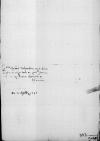Letter #1721
Ioannes DANTISCUS to Tiedemann GIESELöbau (Lubawa), 1537-09-24
English register: Dantiscus encloses the letters he received the previous day from Cracow (from Jan Chojeński) and from Rome from Dietrich von Rheden, for Giese’s perusal. Dantiscus informs Giese that the king is returning to Cracow on September 24. He hopes this will facilitate their further actions (on formal issues concerning the succession in the Warmia and Chełmno bishoprics). He asks Giese to send him the proper formulations of the letters that the king will send to Rome, as soon as possible – when he receives them, he will send them to Cracow immediately. Dantiscus advises Giese to write a letter to the king thanking him for the appointment to the Chełmno bishopric and asking him to entrust further actions in this matter to the Cracow bishop (Jan Chojeński), and also to write to the Cracow bishop thanking him for his goodwill to date and asking that it continue. Dantiscus does not dare to refuse Chojeński’s request that he resign from the Warmia canonry in favor of Stanisław Hozjusz – he asks Giese for his advice. He thinks Alexander Sculteti (who tried to obtain this canonry for his cousin) will find Chojeński a tough adversary. Dantiscus wants Giese to inform him of the date of his arrival in Lubawa. In view of the great costs both of them will have to bear when arranging the formalities in Rome, Dantiscus asks Giese whether there is a practice whereby an elected or postulated bishop can use the income of his future bishopric before the papal confirmation.
| received 1537-09-25 Manuscript sources:
Auxiliary sources:
Prints:
| ||||||||||
Text & apparatus & commentaryPlain textText & commentaryText & apparatus
Reverendissimo Domino
Reverendissime mi Domine, Frater et Amice carissime atque observan(de) or observan(dissime)⌈observan(de)observan(de) or observan(dissime)⌉. Salutem cum omnis felicitatis accessu, fraternique amoris commendatione.
1537-09-23⌊Heri1537-09-23⌋, postquam puerum Dominationis Vestrae Reverendissimae a me dimisissem, in ipsa meridie mihi adiunctae istae litterae ex
Si et quando ad me Dominatio Vestra Reverendissima ventura est, faciat me paulo ante adventum certiorem, rescribatque mihi, si in usu est apud ecclesiam nostram, quod electus seu postulatus ante confirmationem
Ex
Reverendissimae Dominationis Vestrae integerrimus frater
[1] On September 23, Dantiscus received letters from Cracow from Jan Chojeński (cf.
[2] At the time, Alexander Sculteti was trying to obtain the Warmia canonry for his nephew Alexander von Suchten (cf. e.g. Alexander Sculteti’s letter to Dantiscus of September 8, 1537 (cf.
[3] Fees for church benefices – annates – were introduced in 1316 by Pope John XXII. The beneficiary’s formal pledge to pay the annates was the necessary condition of receiving a provision bulla for the new office. Starting from the Council of Constance (1414-1418), annates from higher-ranking benefices were to be paid in two annual installments at the Apostolic Camera in Rome. The amount of annates was specified for every benefice, though information was also gathered about the actual situation of each beneficiary and analyzed at the consistory during which the provision was to be settled, and this is doubtless where Dantiscus saw a chance for reducing the fee (cf. Dudziak; further references there). Applications for a reduction to the fee seem to have been widespread at the time, as shown, for example, by the Polish episcopate’s letters to the pope in 1537 (cf. VMPL , No. DLXXX, DLXXXI, p. 520-523). See also letters of Dantiscus
cf.


 BCz, 244, p. 242
BCz, 244, p. 242